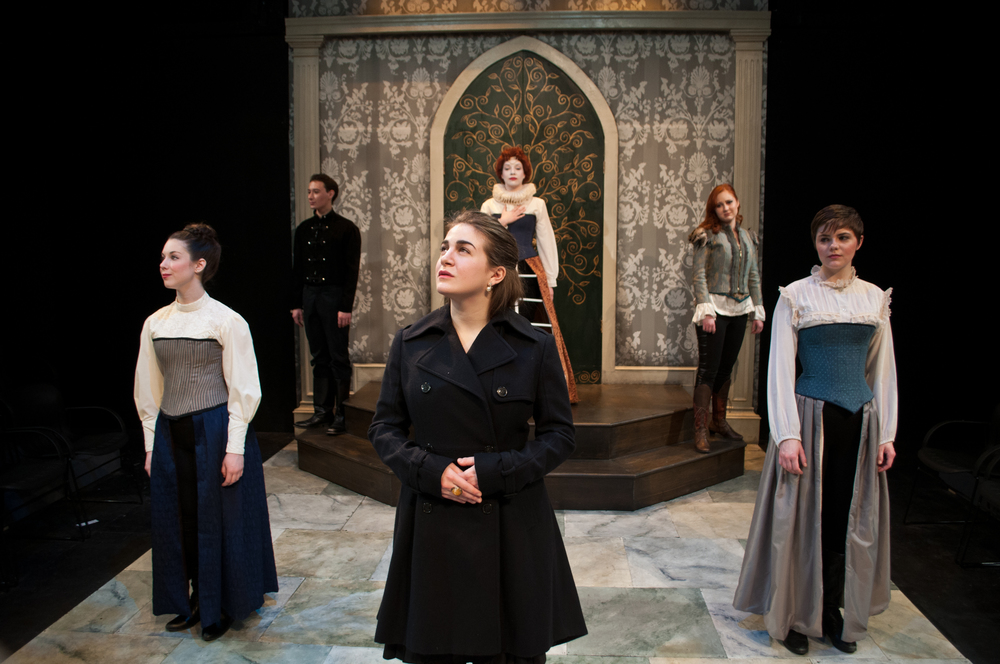
Emily Pintel ’13, Varack Baronian ’13, Olivia Nielsen ’13, Sophie Lewis ’14, Lily Donahue ’15, and Callan Suozzi-Rearic ’14
Boys Will Be Girls
By: Jon Lemay ’15
The act of reading a novel is cosmically different than the experience of seeing a play; different skills and sense are employed in the pursuit of each discourse. However, Skidmore’s Spring Black Box production of Virginia Woolf’s Orlando, adapted by Sarah Ruhl, based on the novel Orlando: A Biography, provided a rare and seamless intersection of the literary world of the novel with the theatrics of the stage. The play follows the life and times of Orlando (Olivia Nielsen ’13)—who, when we first encounter him, is a young man striving to become a poet during the Elizabethan age. After being chosen by Queen Elizabeth (Sophie Lewis ’14) to join her court, Orlando meets and falls in love with the Russian princess, Sasha (Lily Donahue ’15), who brings Orlando’s sexual debut to fruition. She leaves him heartbroken and alone. Orlando then travels to Constantinople, where he goes to sleep for a full week only to wake up and find himself transformed into a woman.
The remainder of the play charts Orlando’s struggle to come to terms with her new identity, as well as the changing of the times; for Orlando’s life—along with the action of the play—spans more than four centuries, beginning in the Elizabethan Age and closing just after the ending of World War I. When we look back on the play, Orlando has played the role of poet, ambassador, duke, duchess, scorned lover, and, finally, a woman who had found peace in her new identity, and her understanding of herself and the world around her.
While the play is technically Sarah Ruhl’s adaptation of Virginia Woolf’s novel, every word that the audience hears belongs to Woolf. In this sense, the play is a faithful adaptation of Woolf’s novel, but Ruhl’s genius lies in her organization of the story’s action into a cohesive play. To accomplish this, Ruhl establishes two different types of lines delivered by the players: dialogue, which is spoken by characters to each other and the audience, and descriptive exposition, delivered largely by a chorus made up of twelve cast members. Regarding the role, chorus member Dara Silverman ’13 said, “The chorus functions as storytellers indebted with the responsibility of keeping the story moving. There are so many years that are flown through so quickly, and I think it was the job of the chorus to prevent Orlando from dwelling in any of the centuries played through.”
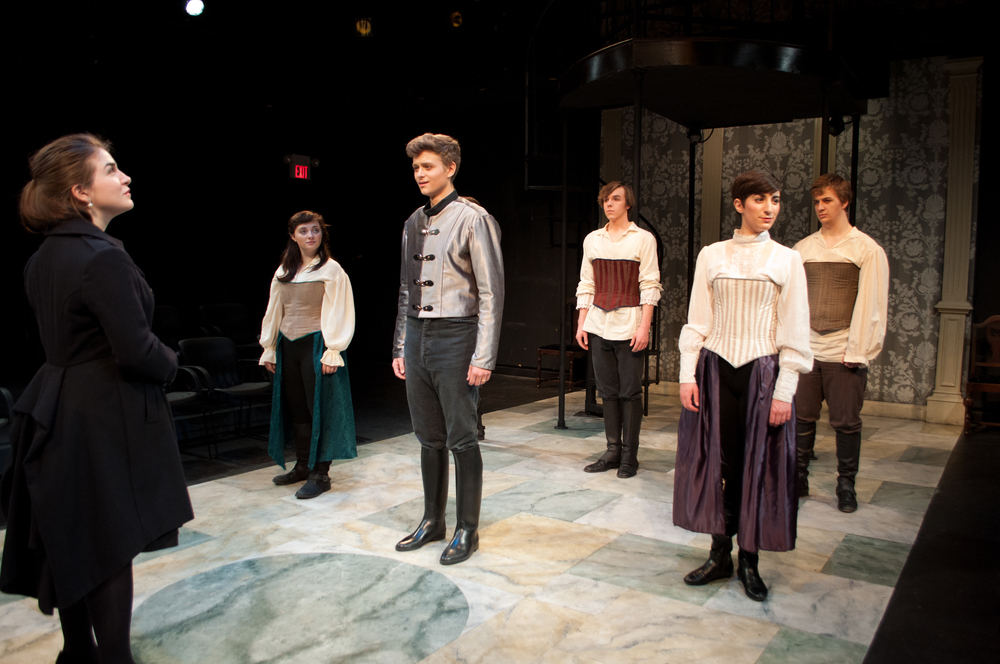
Olivia Nielsen ’13, Taylor Ely ’16, Zac Uslianer ’14, Aaron Ardisson ’16, Dara Silverman ’14, Ryan Crotty ’15
The members of the cast had the rare opportunity to work with two student directors, as Jeremy Ohringer ’13 and Kathryn Rickman ’13 joined creative forces to breath life into the play. The spring black box production is traditionally directed solely by one senior, yet Ohringer and Rickman took a unique approach and proposed to direct Orlando together. One might think that having two very talented directors (with different visions and approaches) work together might create some discord within the rehearsal process, however, as the cast and directors themselves can attest, there was anything but creative dissonance. On co-directing with Rickman, Ohringer describes: “It was an amazing experience. Kathryn and I had no trouble combing our separate yet compatible visions into one. We were actually surprised by how many ideas we shared but came up with separately. When we decided to do Orlando, it was pretty clear that we had the same overall vision in common. We had the goal and then the process was just about incorporating the other elements.”
The majority of the production’s design team was also composed of students who helped bring Ohringer and Rickman’s vision of Orlando to fruition. Naturally, as the audience entered the Black Box, they first encountered the set—ingeniously designed by Julia Bilbao ’13—comprised of a marble walkway with a door at one end, and a spiral staircase leading up to a platform at the other. Bilbao’s set instated a strong sense of specificity in terms of space while allowing for fluidity in terms of time period. The costumes employed a different sense of fluidity, as Nicole Dancel ’13 chose to reinforce Orlando’s gender-bending theme with her costume designs. Regardless of gender, all characters wore corsets, and most of the women wore skirts that split down the center to reveal that they were wearing pants underneath. Queen Elizabeth’s gown was also split down the center, exposing her farthingale and revealing that she too was wearing pants. Such costume choices not only allowed for convenience in terms of costume changes, but also allowed Dancel to “play around” with the ideas of fluidity within gender and time, which are at the heart of the the play.
Since Orlando switches gender halfway through the show, makeup designer Lena Wellhoefer ’14 was presented with quite a challenge in terms of illustrating Orlando’s transformation. Wellhoefer did a thorough job of helping to bring Orlando’s change to life. “I studied the differences in male and female facial structures, and partially applied my findings to Olivia’s face,” Wellhoefer explains. “It involved subtle shading to give the impression of a heavier brow bone as well as contouring of the face and nose to give it a more angular and male feel. When it came time for the transformation, it was easy to wipe away certain features while leaving others intact so there was always a trace of one in the other.” Wellhoefer’s homework certainly paid off, as the changes in Nielsen’s countenance—while successful—were subtle and seamless, reinforcing the theme of gender fluidity.
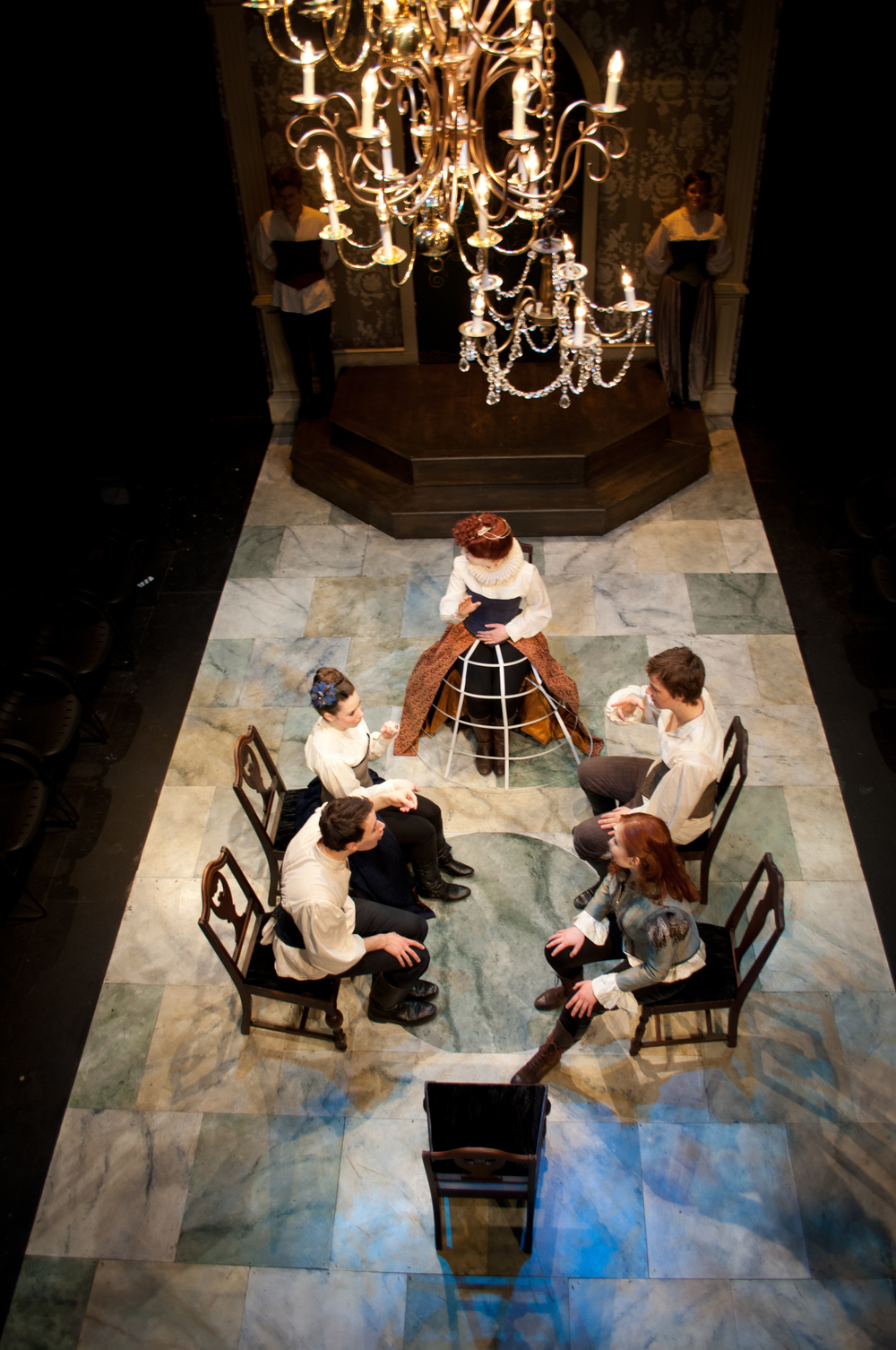
The design team’s meticulous attention was undoubtedly worth it. One can say with confidence that during every performance, each audience member had a unique, personal experience. The cast brought out the humorous elements of the piece, all the while asking the audience to consider some more serious matters about gender roles and identity—matters that come up in everyday life. As with any play, the existence of a script fro Orlando is not enough for theater to take place: it requires a cast and crew to grant it agency on the stand and in out senses. The collective genius of the cast and production team was exhibited in their deft handling of substantial themes and their ability to make poignant commentary on such matters, providing moments of tenderness and humor throughout the production and achieving an impressive balance.
All in all, I can say that, as an audience member, the production contained many elements that make up what I go to the theater for: it captured a part of the human experience in dealing with relatable yet difficult subject matter. Has the average Joseph(ine) undergone a metaphysical switch in gender and transcended the rules of temporality by living through four centuries? I doubt it, but it is safe to say that most of us believe in the transformative power of our experiences and encounters with the world around us. That is certainly at the heart of the play.
Most importantly, I was entertained; my attention was held for every second of the production, and it left me with plenty to ponder. I think what stuck with me most is the final moment of the play. Orlando delivers a monologue in which she attempts to come to terms with all she has witnessed: her crippling feeling of abandonment by a lover; her maturation in an ever-changing global landscape; her sense of peace as she grows into her new gender and her identity as a poet.
Now, it may seem to us that the play does not come to much of a conclusion, for it appears that she struggles to make complete sense of all these experiences. However, we may be wrong to assume that, for when the play draws to its close—with the final moments being aurally framed by a beautiful string arrangement composed by Jarred Green ’15—Orlando delivers her final line: “I am about to understand.” This statement goes beyond the idea of a character learning something and sharing with us a moral in exchange for an hour of our time; it goes beyond the simple I-know-now-what-I-did-not-know-then model.
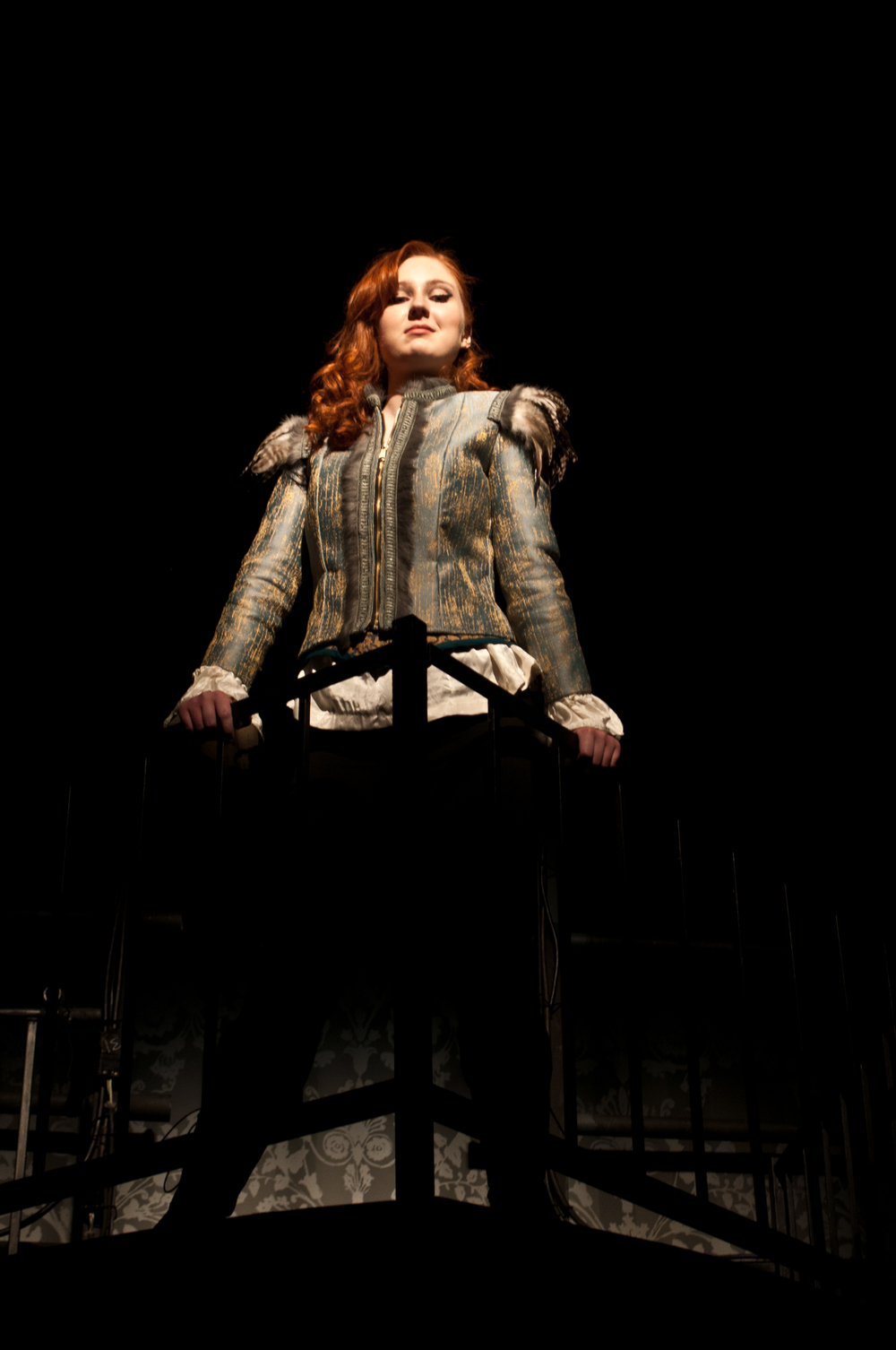
Lily Donahue ’15
The ending implies that Orlando is looking towards the future, acknowledging and welcoming her identity as a malleable individual who has changed and will continue to change; a vessel to be endlessly filled. As someone whose life has spanned form the Elizabethan Age through World War I and beyond, Orlando can be seen as a symbol of the temporal experience of humanity. In this sense, Virginia Woolf’s Orlando, adapted by Sarah Ruhl, is a story about coming-of-age—an initiation not only of the title character, but also of the world.
Not to get too existential on the matter, but this idea of life as an endless experience serves as a wonderful frame of the process of creating theater. When asked to look back on his experiences as a director after just finishing his final project in the Skidmore Theater Department, Ohringer said, “I originally though of Orlando as a culmination of my directing experiences at Skidmore, but now that it’s over, I think of it as just another step forward.” This is an important way of looking at such an event, and one that I’m certain is shared by the other members of the company who are about to begin another chapter of their lives. For as we try to make sense of everything we have experienced (be it in academics, art, what have you) what truly matters is that there will be more experiences to add to the repertoire. As in the case of Virginia Woolf’s Orlando, this wealth of experiences might throw a wrench in the process of figuring it all out, but who says we need to have anything figured out anyway?
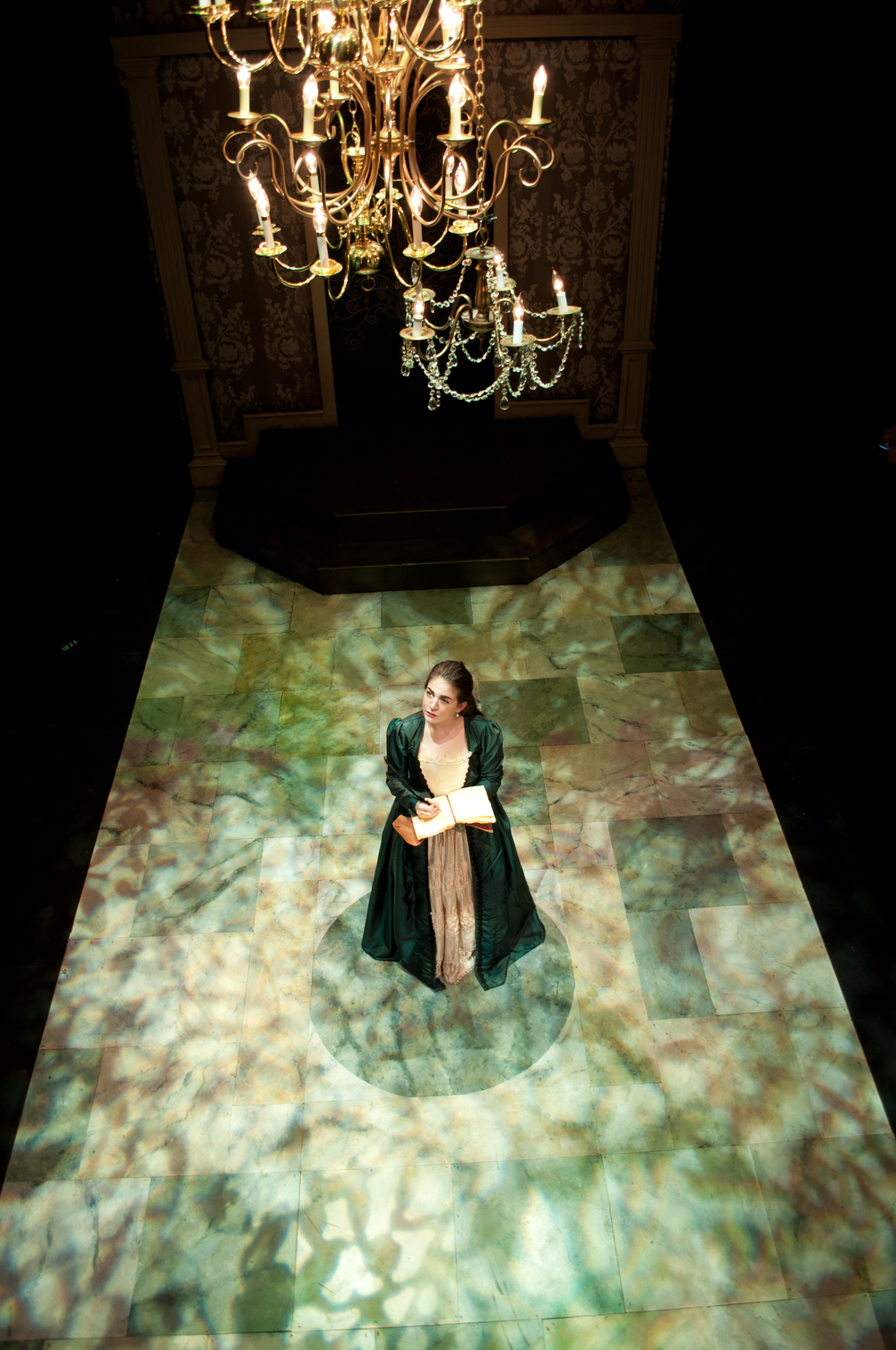
Olivia Nielsen ’15
This article originally appeared in print in the Spring 2013 Skidmore Theater Newsletter.
